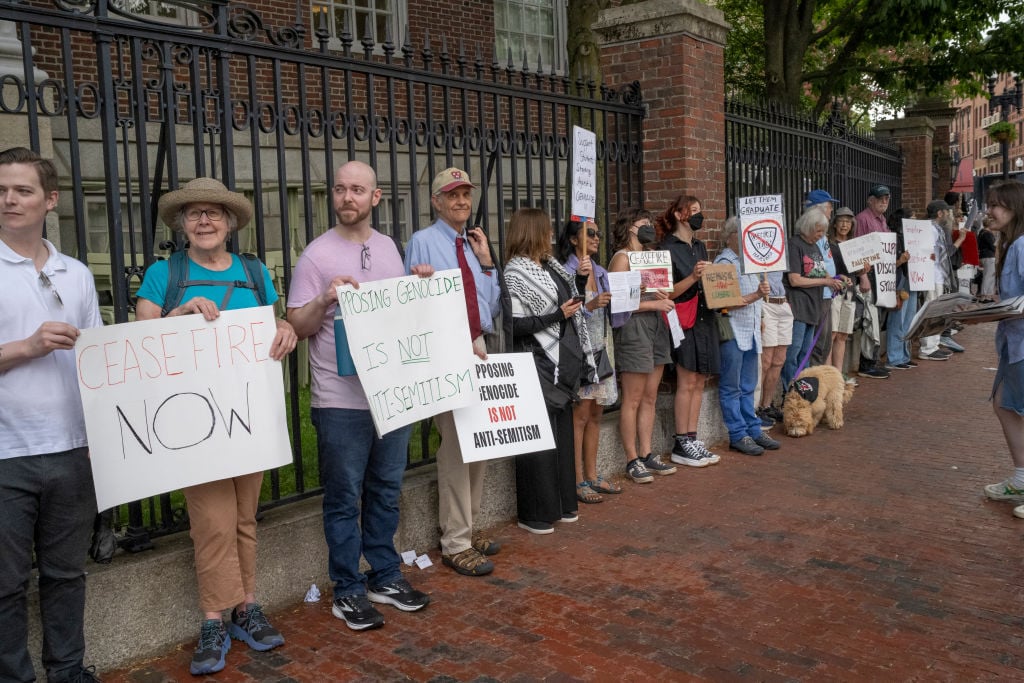Honest, paywall-free news is rare. Please support our boldly independent journalism with a donation of any size.
Hundreds of graduates walked out in protest at Harvard University’s commencement ceremony on Thursday in protest of the war in Gaza and the college’s decision not to confer degrees on 13 pro-Palestine seniors.
Harvard’s controversial decision to block the 13 seniors from graduating strengthened the intensity of Thursday’s demonstration, which was “far larger, louder, and more extensive than graduation protests at any other university in the region thus far this spring,” according to The Boston Globe. Many of the protesting graduates wore keffiyehs, waved Palestinian flags, and carried placards with messages such as “For Gaza.” They chanted “Let them walk!” in support of the 13 students during the ceremony before marching out to a nearby church for what one organizer called the “peoples’ commencement,” the Globe reported.
Earlier:
Harvard University’s board on Wednesday rejected a faculty vote to allow 13 seniors who had participated in a pro-Palestine encampment to graduate, provoking outrage from educators and students, some of whom protested outside the commencement ceremony Thursday morning.
The Wednesday announcement followed competing decisions by Harvard institutions in the days leading up to graduation. On May 18, the college’s administrative board announced disciplinary actions against students — suspending five and placing more than 20 on probation — for their involvement in the on-campus encampment, which ended last week. This left the 13 seniors ineligible to graduate.
Professors in Harvard’s Faculty of Arts and Sciences responded on Monday by voting to amend the list of students receiving degrees to include the 13 students — effectively rejecting the administrative board’s decision. Harvard’s main governing board, known as the Corporation, had to make the final decision, which they announced in a statement on Wednesday:
Because the [13] students included as the result of Monday’s amendment are not in good standing, we cannot responsibly vote to award them degrees at this time. In coming to this determination, we note that the express provisions of the Harvard College Student Handbook state that students who are not in good standing are not eligible for degrees. We also considered the inequity of exempting a particular group of students who are not in good standing from established rules, while other seniors with similar status for matters unrelated to Monday’s faculty amendment would be unable to graduate.
Both faculty and students condemned the decision, which The Harvard Crimson called an “unprecedented veto” of the faculty.
“I would expect a faculty rebellion, possibly a faculty rebellion against the entire governance structure, because there’s already a fair amount of mistrust toward the Corporation to begin with,” government professor Steven Levitsky told the Crimson.
The decision leaves uncertain the immediate future of the 13 students, two of whom have been awarded Rhodes Scholarships to study at Oxford University. “Despite fulfilling their degree requirements, these [13] students will not receive their diplomas, fellowships, and grad funding because of the Corporation’s decision,” Harvard Out of Occupied Palestine, a student group, wrote on social media. The faculty’s vote was a “clear repudiation of the administrative board’s unduly harsh punishment,” the post said.
Pro-Palestine students also said that the Corporation’s decision violated the terms of a deal they had reached with the administration. They ended the 20-day protest on Harvard Yard on May 14 after interim Harvard University President Alan Garber wrote an email promising to “encourage the administrative boards or other disciplinary bodies within the schools to address cases expeditiously under existing precedent and practice (including taking into account where relevant the voluntary decision to leave the encampment), for all students, including those students eligible thereafter to graduate so that they may do so.”
Protestors set up outside of Harvard’s graduation Thursday morning as the college’s other seniors received their degrees.
The tumult at Harvard follows a spring of Gaza-related protests at campuses across the U.S., which have led to thousands of arrests as well as disciplinary action by universities, despite the lack of protestor violence. Many of these colleges still have graduation ceremonies in the coming weeks.
A terrifying moment. We appeal for your support.
In the last weeks, we have witnessed an authoritarian assault on communities in Minnesota and across the nation.
The need for truthful, grassroots reporting is urgent at this cataclysmic historical moment. Yet, Trump-aligned billionaires and other allies have taken over many legacy media outlets — the culmination of a decades-long campaign to place control of the narrative into the hands of the political right.
We refuse to let Trump’s blatant propaganda machine go unchecked. Untethered to corporate ownership or advertisers, Truthout remains fearless in our reporting and our determination to use journalism as a tool for justice.
But we need your help just to fund our basic expenses. Over 80 percent of Truthout’s funding comes from small individual donations from our community of readers, and over a third of our total budget is supported by recurring monthly donors.
Truthout has launched a fundraiser, and we have a goal to add 182 new monthly donors in the next 24 hours. Whether you can make a small monthly donation or a larger one-time gift, Truthout only works with your support.
